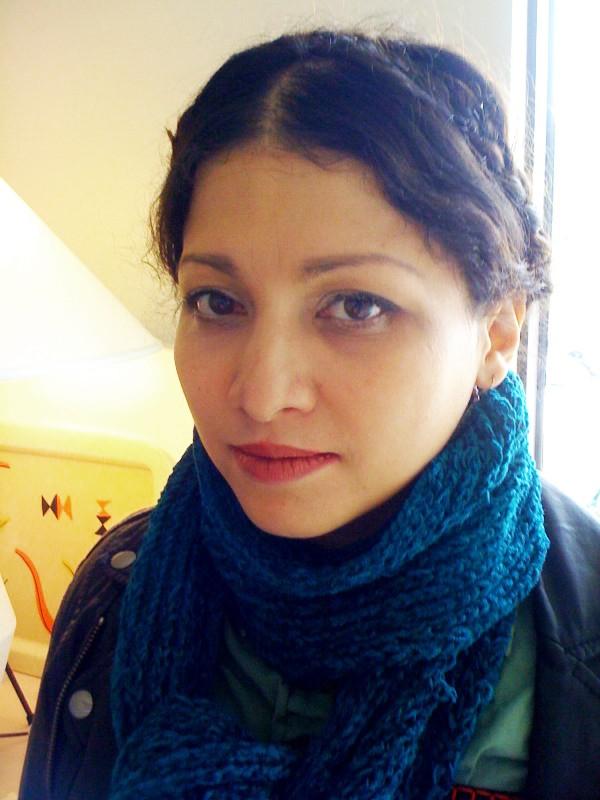Vision-impaired professor to give HerStory lecture

GVL / Courtesy – Melba Vélez Ortiz , Ph.D.
Feb 29, 2016
For the past 13 years, Grand Valley State University has celebrated the lives of women in leadership positions at the institution through the HerStory Series. On March 1, the first installment of 2016 will feature the inspirational story of Melba Velez Ortiz. The event will be held from noon until 1 p.m. in the Kirkhof Center Room 2204.
The HerStory Series is hosted by the GVSU Women’s Commission and has shared the stories of more than 50 women from GVSU faculty and staff. The goal is to build community by looking deeper into the lives of campus leaders and their distinctive journeys through the path of success.
“It provides an opportunity to see a female leader as a real person,” said Kristen Evans, chair of the Women’s Commission. “Often, the women who participate in HerStory will share very intimate details about their lives and their struggles, both personally and professionally, that the campus community wouldn’t have the opportunity to hear otherwise.”
The Women’s Commissions hosts two to four installments of the series each year and the speakers are nominated by members of the GVSU community. Evans said Velez Ortiz was heavily recommended to be the focus of the upcoming installment.
Velez Ortiz has been a communications professor at GVSU for seven years, teaching classes in almost all areas of the study.
Born and raised in Puerto Rico, she moved to Indiana as a teenager to attend Purdue University, but quickly realized her English proficiency stood in the way of her studies. Since Puerto Rico is a commonwealth of the U.S., which made her a citizen of the country, she wasn’t required to take a language proficiency test upon enrolling.
Despite having a yearning for knowledge, she couldn’t complete much of the coursework due to the language barrier and decided to take a break to attend a community college and began working to sharpen her English skills before returning to Purdue to study communication.
“I changed ever since then, I became so interested in rhetoric, which is not a coincidence,” Velez Ortiz said. “Because I was a language outsider and more importantly a culture outsider, I became so interested in what is persuasive, what is honored and sacred in this culture as opposed to mine. So the path for communication opened up for me right away.”
Overcoming the language and culture barriers, she graduated from Purdue University with a bachelor’s of arts in communication. Chasing the thrill of knowledge, she went on to pursue a master’s degree only to run into a more serious obstacle.
During an eye exam, Velez Ortiz was diagnosed with retinitis pigmentosa, a rare, degenerative eye disease that causes severe vision impairment. The doctor told her that one day she will eventually lose her vision completely, but there was no way of knowing exactly when.
During the early part of her career as a teaching assistant, Velez Ortiz’ vision began to hinder her job. While teaching, sometimes students would complain that they had their hands raised for a long time and felt as if she was ignoring them, but really she couldn’t see the student if they were sitting in a particular part of the room.
“I am already a woman of color teaching, that can sometimes mislead people’s perceptions of my expertise and abilities,” Velez Ortiz said. “I also have an accent, so I thought with having all of these things going against me in some way, I’m not going to go up there and say I can’t see on top of that.”
Velez Ortiz said she tried to hide it and pass as fully-sighted for a long time because she didn’t want to burden her students, but with her sight continuing to fade, she eventually had to reveal it to students at the beginning of her classes.
“Many years ago, it was difficult because I felt like I was inadvertently passing on this anxiety to my students, they were worried about me,” Velez Ortiz said. “But now that I’ve become more accepting of it, I reflect something else to the students and they just want to do anything to help.”
Velez Ortiz now incorporates her condition into her class curriculum, teaching students about listening skills by showing them how to use her support cane.
Students learn how to tell the difference between different surfaces like grass and concrete and how to use those sounds to figure out their location.
“I am no longer afraid or ashamed of this and I think that has made me such a better teacher,” Velez Ortiz said. “I am able to provide my students with different exercises that teach them about communication in a unique way.”
The HerStory exposition that Velez Ortiz will present is titled “Life as a Peep Show,” since she feels that her life is exciting because her vision only allows her to focus on one small detail at a time.
Velez Ortiz said peep shows are a cultural practice for many people around the world. They only allow the viewer to see figures and colors through a small hole and provide no anticipation for when it will end. The screen just goes black and it’s over.
“I think that’s what makes me the way I am, because I do live in a little peep show,” Velez Ortiz said. “And I don’t know when it’s going to end, but I am going to have me a good time.”





















